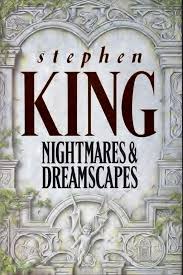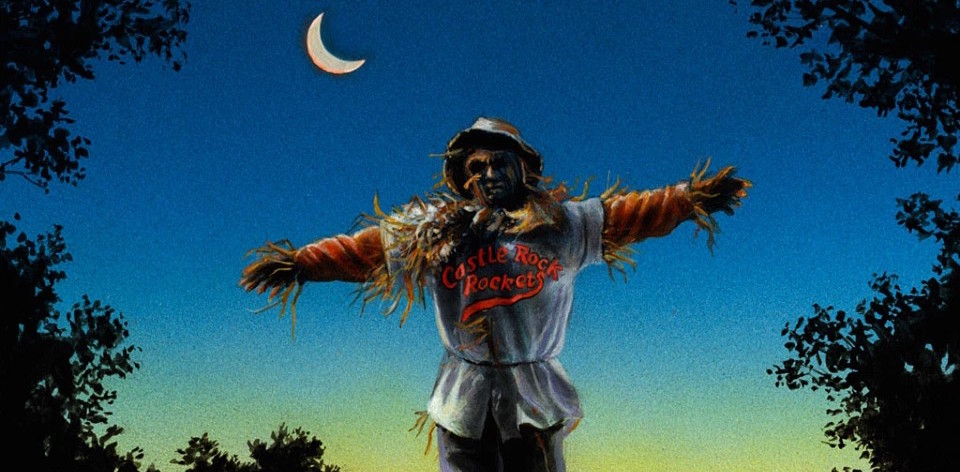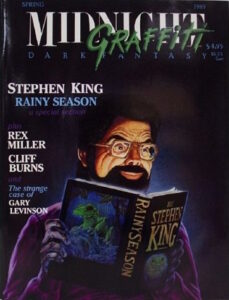Welcome back to the feature column that explores Stephen King’s books in the order they were published…sort of! This collection of stories is as satisfying as it is unnerving.
WARNING: these dreamscapes are a nightmare for spoilers.

If you find yourself enjoying Stephen King in small doses, then you’re in luck.
Over the course of his prolific writing career, his six collections of shorts have showcased well over a hundred stories to date — and counting. In his introduction to 1993’s NIGHTMARES & DREAMSCAPES, King’s third published collection of shorts, King declares it to be “an uneven Aladdin’s cave of a book, one which completes a trilogy of which Night Shift and Skeleton Crew are the first two volumes.”
Collecting all the self-described “good stories,” King’s third official compilation is arguably one of his strongest to this point. At the very least, it’s his most diverse collection. Consisting of stories published in various places between 1971 (‘Brooklyn August’) and 1992 (‘You Know They Got a Hell of a Band’), King has also included a handful of hitherto unreleased stories too.
The first few entries feel like they are solidly in ‘traditional’ King territory, if such a thing exists. Opener ‘Dolan’s Cadillac,’ for example, is one that King says he “absolutely loathed” when he first finished it. Yet time has been relatively kind to the piece he calls an “archetypal horror story, with its mad narrator and its account of premature burial in the desert.” Once you get through the weirdness of ‘Suffer the Little Children’ — a Ray Bradbury style piece that King says has “no redeeming social merit whatever” — we’re on even firmer ground with ‘The Night Flier.’
First published in the 1988 anthology Prime Evil: New Stories by the Masters of Modern Horror, ‘The Night Flier’ follows a tabloid reporter for Inside View as he investigates a would-be vampire. The taut mystery-cum-horror tale will appeal to lovers of ‘Salem’s Lot, but the King connections don’t stop there. Inside View turns up repeatedly in the Dark Tower multiverse, while the character of Richard Dees first turned up in The Dead Zone (1979) a decade earlier. Indeed, the next story in this collection — ‘Popsy,’ a story of a kidnapping gone wrong thanks to the identity of the boy’s father — features a bat-like creature that King says is connected to his Night Flier.
Indeed, there’s metatextual links all throughout the anthology. The Boston-based ‘The Ten O’Clock People’ — a tale that seems to call out the demonisation of the smoking class — features creatures that fans have said are not dissimilar to the Can-toi of Low Men in Yellow Coats and the Dark Tower. The evil house in ‘It Grows on You’ is situated in Castle Rock, and serves as an epilogue to Needful Things. Two stories are from worlds King didn’t originate: the Lovecraftian ‘Crouch End’ was originally spotted in New Tales of the Cthulhu Mythos (1980) while ‘The Doctor’s Case’ first found readers in The New Adventures of Sherlock Holmes (1987). (If you get the audiobook edition, Tim Curry is the mellifluous voice behind both tales and that may be worth the price of admission alone).
It’s fair to say that King wanders all over the sub-genre map in NIGHTMARES & DREAMSCAPES. There’s the claustrophobic and genuine body horror of the Poe-esque ‘The Moving Finger’ and the cursed doll antics of ‘Chattery Teeth’ (itself recalling King’s own short ‘The Monkey’ in Skeleton Crew). There’s post-apocalyptic visions in both ‘The End of the Whole Mess’ and the George Romero inspired ‘Home Delivery.’ Rock ‘n roll heaven becomes hell on Earth in ‘You Know They Got a Hell of a Band.’ We see King play with form too — ‘Sorry, Right Number’ transcribes a teleplay from the Tales from the Darkside TV series, while ‘Head Down’ is a nonfiction essay for The New Yorker about the 1989 season for his son Owen’s Little League baseball team. The latter is followed by a companion poem (‘Brooklyn August’) that reminds us of King’s love of the sport.
One of my favourites is ‘Umney’s Last Case,’ a previous unpublished work that combines the hardboiled fiction of Raymond Chandler with the metafictional leanings of King’s later sagas. Opening with the titular private dick in Los Angeles of the 1930s, Umney discovers that his unravelling life is the work of a writer in the 1990s who wants to take his place. What’s most appealing isn’t just the easily imitable Sam Spade voice, but that the same voice is opening up a dialogue between the writer and his creations. It speaks to the transportative power of fiction for both creator and characters. Years later, King would actually transport himself into his own fiction, rewriting his own fate in much the same way Umney’s creator did. A TV adaptation of the episode earned star William H. Macy an Emmy nomination.

There’s a stack here I haven’t even mentioned, not because of their artistic merit — although I suppose if they’d stood out one way or another I’d have written about them — but mostly because time is wearing on and there are other books and films to dissect. Yet that’s the thing about King: even when you think you might be done with him, you’ll find yourself returning to the germ of one of these stories or boldly declaring you’ll reread the entire Dark Tower saga by Christmas. (Even if the year is to be determined).
Boldly stating that “all the good stories have now been collected; all the bad ones have been swept as far under a rug as I could get them,” King’s kept that promise to date. With the exception of a few short stories that have resurfaced in the odd collection or magazine, and the scores of unpublished pieces we may never see, King’s continued dedication to the short form has all been new material since this volume. Yet if this volume proves anything, it’s that long forgotten treasures can be given new life with fresh eyes, and the line between nightmares and dreamscapes is thinner than we might imagine.
Next time, Inconstant Reader hits up Lisey’s Story ahead of the Apple TV+ series. Then it’s back to irregular programming with Rose Madder, a novel where King combines domestic horror with Greek mythology and his Dark Tower saga. While you’re here, go check out Batrock.net, where my buddy Alex Doenau is running through this Stephen King adventure with me.





